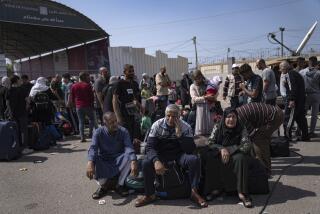In Iraq, U.S. Takes New Approach to Mosque Raids
As U.S. troops mount a concentrated effort to clear insurgents from Ramadi this summer, they have joined with Iraqi forces in a delicate campaign to flush fighters from a culturally sensitive haven: the city’s mosques.
Not only are religious sites protected under international treaty, but Iraqis are particularly touchy about non-Muslims entering a mosque. Americans cannot search them without alienating the population they are trying to win over. But insurgents hide where U.S. forces do not go.
Now U.S. troops have come up with a solution: using Iraqi police officers to enter the holy sites. The police in Ramadi have put together a team that specializes in clearing mosques.
In west-central Ramadi, 1st Lt. John Warren, a Marine platoon leader, recently received a tip that a suspected Al Qaeda member named Bakr and another suspected insurgent frequented the final prayer service at the Suphi al Hetie Mosque.
Bakr was suspected of having a role in a January bombing that killed 60 police recruits and intensified the violence in this city.
Mosque raids must be approved by the U.S. military headquarters in Baghdad. Warren’s request was initially rejected; officials have been wary of launching mosque raids based on often-skimpy intelligence.
But the Marines argue that if Iraqi police were allowed to regularly search mosques, insurgents quickly would be driven out of them, a result many Iraqis would appreciate.
“If the threshold was lower, they would not use them as much,” said an intelligence officer who had sent the request up the chain of command. He declined to be identified.
The Marines’ appeal was heard; the raid was approved in Baghdad.
That night, Warren gathered a group of police officers, who are predominantly Sunni Muslim in this mostly Sunni city.
He outlined the plan and told them the target was behind the killings of fellow officers.
“The target may try to hide in the mosque, so I need you to clear it,” Warren said. “Together we will get justice” for the slain officers.
Capt. Max Barela, the U.S. commander, sat looking at a map of the city.
“It’s probably one of the most complex operations the police have done,” he said. “You are going into a place that is culturally sensitive. The police have to have extreme care. How they do it will be a test.”
Warren told him the Iraqis were excited. “I told them we were going after a cop killer.”
About 10 p.m., the time of the final prayers of the day, the Iraqi officers rolled up to the mosque. With a platoon of Marines cordoning off the streets, an Iraqi police squad marched into the courtyard of the mosque, but found it empty.
Warren was incredulous. The intelligence was solid. The Marines speculated that the targets had been warned.
Warren agreed. “There is not a single person on the street,” he said. “Right now it looks like they got the tipoff we were coming.”
But there was no tipoff.
The Marines, who had planned to take any detained suspects to a nearby house for questioning, learned from the homeowner that the mosque had not been conducting final evening prayers. “At the main mosque they do the final prayer, but not here,” he told the Marines. “Here it is too dangerous.”
With that information, Warren made plans to hit the mosque on another night, but during the second-to-last prayer.
This time, the mosque was full, with about 60 men and boys. As the Iraqi police officers swept through the building, an Iraqi Sunni interpreter working with the Americans helped screen worshipers.
The platoon selected about 30 men for questioning at the nearby house.
As the Marines photographed them, the imam of the mosque approached Warren. The Marine expressed regret about the mosque being searched and told him that the team was looking for a man who had killed Iraqis.
“I know,” the imam told Warren. “I stopped the morning and evening prayer because there were bad people.”
With the pictures of the men from the mosque, Warren returned to one of his informants, who said that several of the detained men were the suspected insurgents sought by the battalion. When Warren returned to the house, he seemed excited. The raid, it now appeared, could net several suspects.
But Warren’s prime suspect had been claiming that his name was Ahmed.
When he rose to leave the interview room, the interpreter had an idea -- he called out, “Bakr.” The man turned, and the look on his face, the Marines said, showed he knew he had been caught.
During questioning, Bakr claimed to be a member of a nationalistic Sunni insurgent group, not Al Qaeda.
But later, a Marine intelligence officer said, additional evidence indicated that Bakr was an Al Qaeda member who had helped plot the bombing.
After the operation was wrapped up, Warren approached the Iraqi officers, sitting together in the house near the mosque.
“The man over there killed over 60 police recruits in January,” Warren told them. “Together, we have caught him.”
More to Read
Start your day right
Sign up for Essential California for news, features and recommendations from the L.A. Times and beyond in your inbox six days a week.
You may occasionally receive promotional content from the Los Angeles Times.






